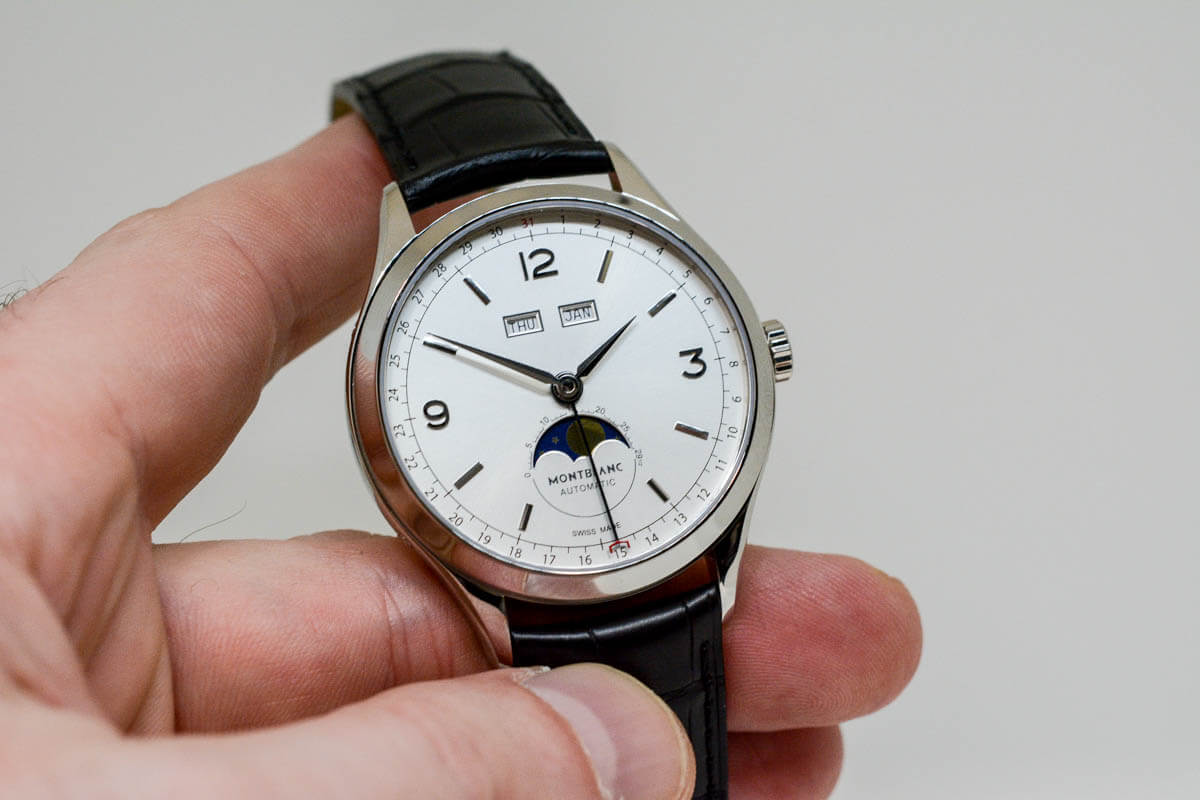Hands-on with the Montblanc Heritage Chronométrie Quantième Complet (Complete Calendar) – Photos, Specs and Price

This year Montblanc introduced the entirely new Heritage Chronométrie collection, which immediately sparked interest from collectors. The collection features classic looks coupled with classic complications, and even classically sized watches. The Montblanc Heritage Chronométrie Quantième Complet is also part of this new collection, featuring a quantième complet – or complete calendar in English – in a beautiful 40 mm timepiece that is only 9.7 mm thick. Classic looks, Classic dimensions and a classic complication and all that for a very competitive price.
The various calendar watches
There are several types of calendar watches, from the simplest calendar that displays the date, to day/date indications, to the so-called complete calendars, annual calendars and even perpetual calendars. All calendars need adjusting, however the first three (simple, day/date and complete) have to be adjusted most often: five times per year, in every month with less than 31 days. The annual calendar has to be adjusted in February of every year, except in leap years, and perpetual calendars might need their first adjusting in a hundred years from today. This makes the complete calendar actually a ‘simple calendar’ (because of the five adjustments per annum). It has however been a popular complication since the 1950’s and could be found on many wristwatches from high-end brands, and often with the same layout of calendar displays.
Often the day of the week and month are displayed in small rectangle apertures on the upper half of the dial, and the date is indicated with a sleek and long pointer-hand. While it officially is no part of the quantième complet, this calendar type is often extended with a moon phase indication. This was already done on the Montblanc Star Quantième Complet that was introduced two years ago, and the Montblanc Heritage Chronométrie Quantième Complet features a similar layout with additional moon phase indication.
The Montblanc Heritage Chronométrie collection
This year Montblanc has introduced several calendar watches, including a variety of annual calendars, in the Heritage Chronométrie collection. All watches from this collection share the same classic design cues and dimensions, and that’s why they are so popular. After a decade of the ‘big-bigger-biggest fashion’ we finally seem to move towards more classic sizes. That should not be taken too literally, because before the early 2000’s every wrist watch of 40 mm was considered quite hefty. Now-a-days 40 mm is often seen as a small, classic size.
With a case height of less than 10 mm (the Heritage Chronométrie Quantième Complet measures 9.70 mm in height) and a diameter of 40 mm, this watch perfectly fits under the cuffs of your shirt, also when wearing cuff links that can make the cuff kind of tight. The round three-part case is polished, with a satin finished bezel, and comes on an alligator leather strap that is made in Montblanc’s own Pelletteria in Florence. These ‘in-house’ made straps are exclusive for all watches of Montblanc’s Heritage Chronométrie collection, as is a relief engraving of the Montblanc emblem placed atop the crown.
Another signature characteristic is that every Montblanc Heritage Chronométrie timepiece has to meet high precision and quality standards, and will be subjected to the ‘Laboratory Test 500’. During this test lasting 500 hours, a simulation of the watch being worn on the wrist under normal conditions right through to extreme situations is carried out. It guarantees that all timepieces that leave the Montblanc Manufacture in Le Locle, where the Laboratory Test 500 are of executed, are of impeccable quality. Montblanc’s director of watches, Alexander Schmiedt, explained the Laboratory Test 500 to us in this interview.
The Montblanc Heritage Chronométrie Quantième Complet
The dial features a sunburst pattern in a silvery-white colour. On the dial’s perimeter are the date numerals printed, all in black, except the “31” which is printed in red. The applied hour indices – Arabic numerals for the 3, 9 and 12, and stick markers for all other hours, except the 6 – are rhodium-plated and the stick markers are facetted. The sword-shaped and rhodium-plated hour and minute hands are also facetted, and the date-hand bears a little red crescent at its tip to enhance the legibility of the date.
Time can be set via the crown, and all calendar functions can easily be adjusted through individual correctors in the case side. This has to be done with a dedicated pin that is delivered with the watch. The Heritage Chronométrie Quantième Complet comes with its individual Laboratory Test 500 certificate for a price of € 4,700 Euro (including 21% VAT).








2 responses
In your description about calendar watch types you missed one, which, following your categorization, should be inserted in between the “annual” and the “perpetual”.
It’s the so called “1461” (at least that is the name given by Breitling). 1461 is the number of days in between adjustments as it has to be adjusted only every leap year on Feb 29th.
This complication takes February always as 28 days.
MAG.
It’s a bit of an unknown variation between the calendars, MAG, so we choose not to cover it in this very brief overview.